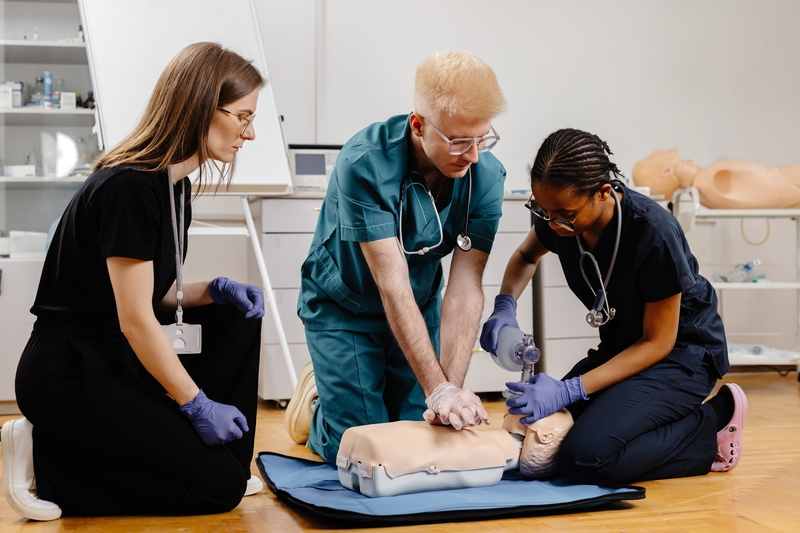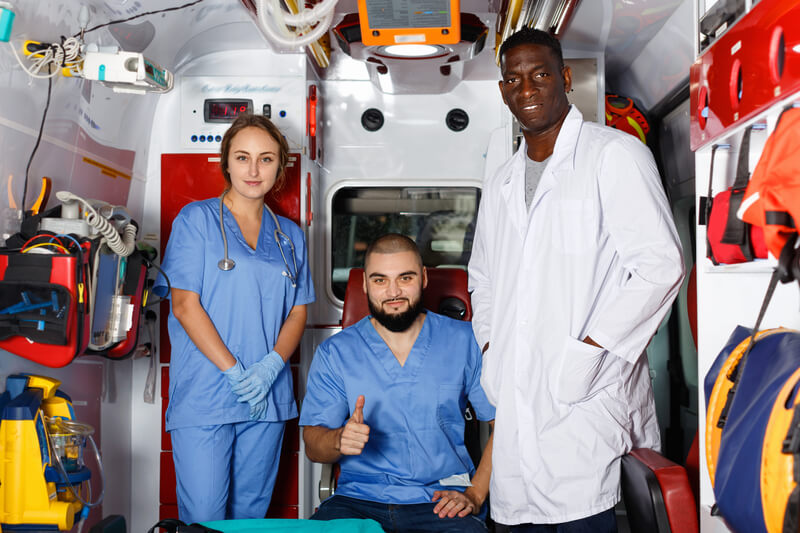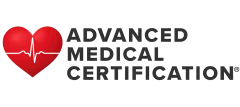How to Renew ACLS
If you work in emergency or critical care, chances are your Advanced Cardiac Life Support (ACLS) certification is one of the most important credentials you hold. Physicians, nurses, paramedics, and other frontline healthcare professionals rely on ACLS training to respond properly in life-threatening situations.
Like most medical certifications, ACLS isn’t a “one-and-done” thing. To ensure every provider is working from the latest science and protocols, ACLS must be renewed every two years. This regular recertification protects patients, strengthens your skills, and keeps you compliant with hospital and employer requirements.
The good news is that while the initial ACLS course you take when earning your ACLS credential for the first time is longer and more in-depth, recertification is a shorter, focused update that builds on your existing knowledge, ensuring you’re aligned with the latest guidelines.
How to Renew ACLS Certification?

1) Find a trusted, guideline-current provider Search “ACLS classes near me” or “online ACLS recertification.” Select a provider that aligns with the most recent International Liaison Committee on Resuscitation (ILCOR) guidelines and is widely recognized by employers. If you need continuing education, look for CME/CE options. Pro tip: double-check your hospital’s policy for accepted providers before you enroll.
2) Enroll in the ACLS recertification course format that fits your schedule
Pick the path that meets your employer’s requirements and your learning style.
- Online: Self-paced and flexible; ideal for busy clinicians.
- In-person: Traditional classroom experience with live instruction.
- Hybrid: Online coursework plus an in-person skills check.
3) Review the core ACLS content
Refresh the essential course materials you use when you’re on shift through practice exams, megacode scenarios, and quick-reference algorithms to lock it in fast.
4) Pass the renewal assessment
Most renewals include a cognitive exam and, depending on the format and employer policy, a skills test. Some online providers don’t require a classroom skills exam; others (and some employers) still do. It’s good practice to check ahead of time what your facility expects so there are no surprises.
5) Receive your updated ACLS eCard
You’ll get a digital provider card upon course completion (some providers also offer printable/physical cards). Upload it to your HR/credentialing system, save a copy to your phone, and set a reminder to renew again before the 2-year mark (90 days out is a great target).
What to Do When ACLS Certification Expires?
Busy shifts, long hours, or job changes can make it easy to lose track of time. It happens sometimes. That being said, since advanced cardiovascular life support certification is only valid for two years with no official grace period, an expired card means you’re technically no longer certified. That can impact your ability to work certain shifts or meet employer requirements. But don’t worry, it’s easy to get back on track.
Here’s what to do next:
1) Check the expiration date on your eCard
Your ACLS provider card has the exact expiration date printed on it. If you have a digital eCard, log in to your account or download the PDF to confirm whether your certification is still current.
2) Access your provider’s online portal
If you trained through an online program, most providers offer a portal where you can view your certification history. This is the fastest way to confirm your expiration date and start the renewal process right away.
3) Search your confirmation emails
If you can’t locate your card or portal login, look back through your email for enrollment or completion confirmations. These typically include your course date and sometimes your certificate as an attachment.
4) Visit or call your training center
If you completed ACLS in a classroom setting, you should be able to contact the training site directly. They’ll be able to confirm your certification status and guide you on how to re-enroll.
Even if your ACLS certification has already expired, most providers (including AMC) allow you to recertify rather than start over from scratch.
What Happens If You Miss a Renewal?
Here’s what’s at stake if you let your certification lapse:
- Lose active status—Without renewal, you may be sidelined from performing the procedures and advanced interventions ACLS trains you for (and that your patients depend on you for).
- Retake the full course—If you work for an organization with a strict certification policy, you might be required to complete the entire certification again.
- Temporary pause on clinical duties—Some facilities remove staff from critical responsibilities until their ACLS is current.
- Miss career opportunities—Whether it’s a promotion, a specialty role, or a new position, expired credentials can stand in the way of your growth.
Renewing your ACLS certification can feel like a hassle, but shifting your thinking can help. It really is meant to keep you sharp, respected, and prepared to deliver the best care possible.
Tips To Make Your ACLS Renewal Stress-Free
Use online practice tools and rhythm quizzes
Sharpen your knowledge before exam day with quick practice tests, ECG rhythm quizzes, and algorithm reviews.
Don’t wait until the last minute
Set a reminder 60–90 days before your expiration date. Planning ahead gives you flexibility for completing the course and makes sure your work doesn’t get interrupted.
Choose accredited centers
Whether online, in-person, or hybrid, always make sure your provider follows the latest ILCOR guidelines and offers widely accepted certifications.
Prepare for exam day
Treat your renewal like a clinical shift: get good rest, review the material, and show up focused and ready to go.
What’s Covered in an ACLS Renewal Course
Each recertification course follows the most current ILCOR guidelines, which are recognized worldwide as the gold standard in resuscitation science. Here’s what you’ll dive into:
Updated ILCOR Guidelines
ILCOR continuously reviews global research and clinical evidence, then issues consensus recommendations on resuscitation and emergency cardiovascular care. Renewal courses ensure you’re aligned with the most current evidence-based practices, from changes in compression-to-ventilation ratios to new insights in post–cardiac arrest care.
Adult Cardiac Arrest Algorithms
You’ll review and practice step-by-step pathways for treating adult cardiac arrest. This includes:
- Early recognition and activation of emergency response.
- High-quality chest compressions with minimal interruptions.
- Integration of AED/defibrillation at the right moments.
- Coordinating team dynamics for rapid, organized response.
Tachycardia & Bradycardia Management
Cardiac rhythms can change in seconds. Renewal courses refresh your ability to:
- Distinguish between stable vs. unstable tachycardias.
- Apply appropriate interventions: synchronized cardioversion, pharmacology, or observation.
- Recognize symptomatic bradycardia and manage with atropine, pacing, or advanced airway support.
CPR and AED Integration
Even seasoned clinicians benefit from reinforcing the fundamentals. Renewal focuses on:
- -Delivering high-quality compressions (rate, depth, recoil, minimizing pauses).
- Coordinating chest compressions with defibrillation using AEDs or manual defibrillators.
- Avoiding common errors like hyperventilation or prolonged interruptions.
Pharmacology, Airway Management, and Megacodes
Renewal also brings you back to the essentials of drug therapy and airway control:
- Pharmacology: Dosages, timing, and indications for epinephrine, amiodarone, adenosine, magnesium, atropine, and vasopressors.
- Airway Management: Strategies for bag-mask ventilation, supraglottic devices, and advanced airway placement.
- Megacodes: Simulation scenarios where you manage complex cardiac emergencies from start to finish.
Frequently Asked Questions
How Much Does ACLS Renewal Cost & How Long Does It Take?
On average, ACLS renewal courses range from $120 to $250, depending on the provider, format, and whether CME/CE credits are included. With AMC, you can complete your renewal 100% online in under an hour, at your own pace, and still earn up to 8 AMA Category 1 Credits™.
Can I renew ACLS if my job doesn't require it anymore?
Yes! Many professionals choose to. Even if your current role doesn’t require ACLS, keeping it active demonstrates your ongoing commitment to delivering quality patient care. It also keeps doors open for future opportunities in emergency, critical care, or leadership positions. Thinking of renewal as an investment in your professional growth and readiness is a great mindset to have.
Is ACLS harder than BLS?
ACLS builds on the fundamentals of Basic Life Support (BLS) and goes further with rhythm interpretation, pharmacology, airway management, and team-based resuscitation scenarios. Where BLS focuses on high-quality CPR and AED use, ACLS prepares you for the decision-making and advanced interventions required during complex cardiac emergencies. Renewal ensures you stay sharp in both areas, since the skills complement each other.
Your Next Step in Lifesaving Care

With Advanced Medical Certification, you can complete your ACLS renewal on your terms:
- Take a 100% online recertification and complete in under an hour
- Gain up to 8 AMA Category 1 Credits™ through PIM accreditation
- Receive your nationally accepted digital provider card instantly upon completion
- Get unlimited exam retakes and a full money-back guarantee
- Use exclusive study tools, videos, and practice quizzes to make preparation stress-free
Ready to keep learning? Explore AMC’s full library of resources and journal articles to stay sharp, motivated, and prepared for your next shift.

